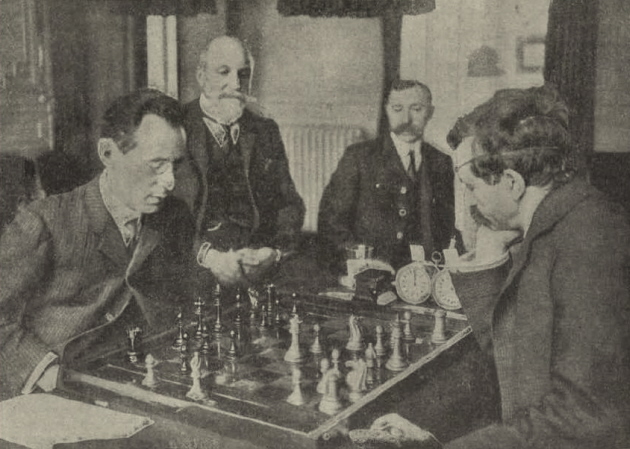
Edward Winter

Dawid Janowsky and Emanuel Lasker (Wiener Schachzeitung, December 1909, page 411)
We summarize the proof that the match in Paris between Lasker and Janowsky in autumn 1909 (won by Lasker +7 –1 =2) was not for the world championship. First, an extract from a letter that we contributed on pages 305-306 of the July 1985 BCM:
‘A check of all major chess periodicals for 1909 at the Royal Library at The Hague reveals that:
a) In many magazines the idea of the match being for the world championship is simply not mentioned (e.g. BCM pages 483 and 543).
b) Others are specific that the title was not at stake (e.g. Deutsches Wochenschach und Berliner Schachzeitung page 382, Tijdschrift van den Nederlandschen Schaakbond page 253). The match was played in Paris, so it is no surprise that French-language magazines are especially precise in refuting any world championship connection (e.g. La Stratégie pages 352 and 407, and Revue d’échecs page 214).
c) Not a single contemporary magazine has been found that suggests the match was for the world crown.’
Further details were given in C.N. 2471 (see page 174 of A Chess Omnibus), as reproduced below.
On 15 September 1909 Lasker and Schlechter issued a joint announcement (from Berlin and Vienna) of their intention to play a world championship match during the coming winter. The text was published in the Wiener Schachzeitung, September 1909 (page 315) and the Deutsche Schachblätter, 3 October 1909 (page 85). Not surprisingly, therefore, contemporary magazines did not suggest that the ten-game Lasker-Janowsky encounter played from 19 October to 9 November 1909 was for the world title, and some (especially the French ones) specifically stipulated that it was not. Page 214 of the 1909 Revue d’échecs said that it was merely ‘un second duel courtois’. Page 352 of the October 1909 La Stratégie observed that because of the Lasker-Schlechter agreement Janowsky would have to wait for a title match until afterwards. In its November 1909 issue (page 407) La Stratégie reported that Janowsky was not discouraged by his heavy loss to Lasker in Paris and added: ‘we understand that fresh discussions are already under way between the same players for another, more important, match, one which will count for the world championship, subject, naturally, to the Champion’s victory in his forthcoming match against Schlechter.’
On pages 60-61 of the February 1910 La Stratégie [reproduced below] it was reiterated that Lasker and Janowsky had not played for the title in Paris, and the magazine published the full text of an agreement signed by the two masters in the French capital on 12 November 1909. This was for a match that would begin in October or November 1910, and clause 15 stated: ‘The match shall be for the championship of the world. If Dr E. Lasker loses his title in his forthcoming match with Schlechter, the entire present arrangement shall, naturally, be void.’
Lasker survived against Schlechter, and in Berlin on 8 November 1910 there duly began the one and only world championship match between Lasker and Janowsky.
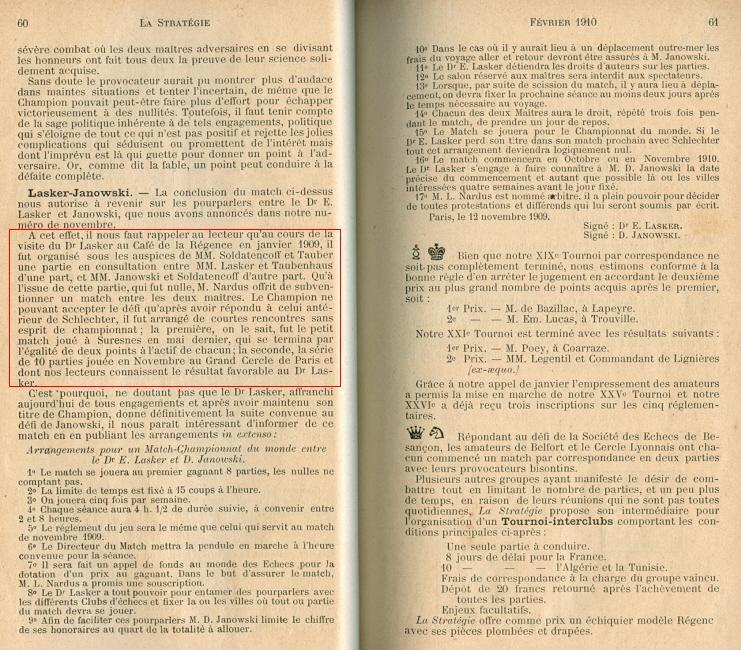
Volume one of The Games of the World Chess Championship by Donald Odom, Jr (Johanneshov, 1993) makes the same mistake as did earlier writers covering the same ground (e.g. Pablo Morán, Constantin Ştefaniu and James H. Gelo) in claiming that the match between Emanuel Lasker and Dawid Janowsky in Paris in 1909 was for the world championship. Clear documentary proof refutes that. See page 306 of the July 1985 BCM and page 29 of the January 1991 Europe Echecs.
(2017)
As noted on page 174 of A Chess Omnibus, the 1909 match in Paris between Lasker and Janowsky was not for the world championship. The evidence and proof being clearcut, there is a consensus on the matter among chess historians, yet the match has repeatedly found its way into various ‘complete world championship games’ collections, such as the volumes by P. Morán (Barcelona, 1974 and London, 1986), J.H. Gelo (Jefferson, 1988 and 1999), C. Ştefaniu (Bucharest, 1989) and D. Odom (Johanneshov, 1993). To this list must now be added the first volume of a trilogy World Chess Championship Matches edited by I. Berdichevsky (Moscow, 2002).
(2957)
From page 267 of Chess Explorations:
‘On page 306 of the July 1985 BCM we listed documentary proof that the 1909 match in Paris between Lasker and Janowsky was not for the world championship. Without any reference to the public record, Mr Raymond Keene has unyieldingly asserted the opposite, and on page 346 of the August 1985 BCM he even claimed that before the longer Lasker v Janowsky matches the latter had “a vaguely level score” with the world champion. C.N. 1029 commented: “The truth is that Lasker was ahead by seven wins, three losses and two draws. This sheds further interesting light on Mr Keene’s attitude to facts: +7 –3 =2 is a vaguely level score but +6 –2 =10 is a Massacre in Merano.”
In 1986 Batsford published an English translation, World Chess Championship, Volume I, by P. Morán. C.N. 1322 reported:
“Both the 1909 and the 1910 Lasker-Janowsky matches have been included and, despite the stubbornness of the company’s chess adviser, we find a Batsford editorial note on page 25:
‘There is substantial evidence that this match was not for the world championship title. However, we have included it for the sake of completeness.’
Let us not quibble about the phrase ‘substantial evidence’ or even the meaningless ‘for the sake of completeness’. What really matters is that the note has been attached to the wrong Lasker-Janowsky match, the one that really was for the world championship. Bravo Batsford.”
In C.N. 1386 Pablo Morán agreed with us that “the 1909 Lasker-Janowsky match in Paris was not for the world championship”.’
The following appeared in C.N. 1285, in our review of The Centenary Match Kasparov-Karpov III by R. Keene and D. Goodman (London, 1986):
As reported in C.N. 1029, we showed in the 1985 BCM that the 1909 Paris match between Lasker and Janowsky was not for the world championship. This was corroborated by Kenneth Whyld in the August 1986 BCM, page 373. And on page 331 of that same issue the Editor gives a list of world title matches and adds that ‘many recent sources give here a ten-game match Lasker v Janowski, Paris 1909, but the best authorities do not include it’. Exactly so. On page 6 of their book Keene and Goodman do.
In Robert Byrne’s chess column on page 14 of the International Herald Tribune of 21 June 1988 (a feature about Janowsky) there were three factual errors in half a sentence:
‘His crushing failure – one victory, seven defeats, one* draw – in his 1909 world championship* match with Emmanuel* Lasker did not deter him from raising the money for a second attempt the following year.’
(1675)
The asterisks mark the mistakes.
In a list of world championship challengers on page 279 of Keene On Chess (New York, 1999) Raymond Keene recorded only the one challenge by Janowsky, in 1910. That was progress, although he incorrectly listed it before the Lasker v Schlechter match held the same year. The same applies to page 280 of the Complete Book of Beginning Chess by Raymond Keene (New York, 2003).
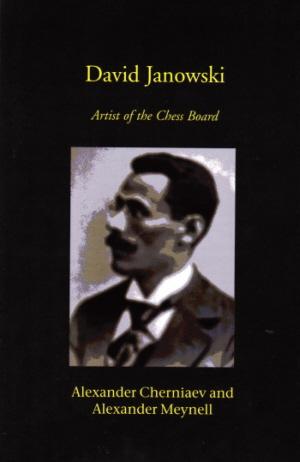
The opening words of the Foreword (page 11) to the dire book David Janowski Artist of the Chess Board by Alexander Cherniaev and Alexander Meynell (Aylesbeare, 2005):
‘At the present time the career of David Janowski amounts to a gap in most people’s knowledge of chess history. They know about him because of the two world championship matches (1909 and 1910) which he played against Emanuel Lasker – and lost without a fight.’
See too the item entitled ‘Plugging’ in Cuttings.
As shown in The Consultation Game That Never Was, the following was published on page 878 of The Field, 22 May 1909 (see too C.N. 1369 and page 174 of Chess Explorations):

Russell Miller (Vancouver, WA, USA) notes a remark by Mihail Marin on page 82 of the Spring 2017 issue of the American Chess Magazine:
‘For 11 years Lasker avoided any new challenge to his title. He only abandoned his ivory tower in 1907 when he defeated Frank Marshall rather convincingly. He also scored victories by a large margin against Tarrasch (!) in 1908 and 1916 and David Janowsky in 1909 and 1910.’
How can anyone write an eight-page history of the world chess championship without knowing that Lasker’s matches against Janowsky in 1909 and Tarrasch in 1916 were not for the title?
Marin’s article (pages 78-85) is one of the worst of its kind that we have seen, a feebly-written job lot of common knowledge and common misconceptions.
(10428)
Page 298 of Z. Franco’s book on Lasker (C.N. 11130) shows his awareness that the only world title match between Lasker and Janowsky was in Berlin in late 1910.
However, the following is on page 23:
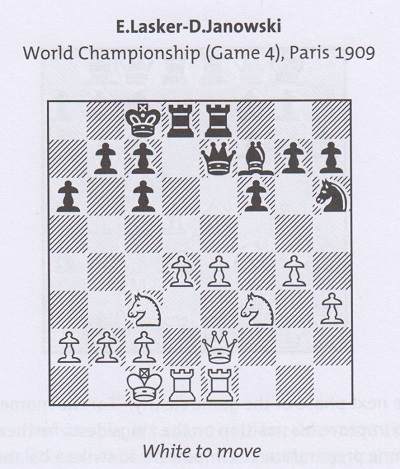
This was merely the last encounter in a four-game match in May 1909. From the report on page 167 of the May 1909 issue of La Stratégie:
‘... M. Nardus, le généreux promoteur du match-revanche Janowski-Marshall, offrit au Champion de subventionner un match entre lui et D. Janowski. A la suite de quelques pourparlers, une lutte importante fut remise à plus tard, mais les conditions d’une courte rencontre immédiate furent ainsi établies: quatre parties seulement; les nulles comptant pour demi-point; 1.000 fr. au vainqueur plus 750 fr. à chacun des deux maîtres.
Commencé le 12 mai en la villa Léa, à Suresnes, ce match s’est terminé le 22 du même mois, avec le résultat négatif de deux parties gagnées par chacun.’
(11140)
Two books by Edward Lasker quoted a conversation with Janowsky in Berlin in 1910, at the time of the latter’s world title match against Emanuel Lasker.
From page 101 of The Adventure of Chess (New York, 1950):
‘Instead of admitting that he spent his nights at roulette, he said to me one day: “I don’t think I will win a game in this match. Lasker plays too stupidly for me to look at the board with any interest.”’
From page 115 of Chess Secrets I Learned from the Masters (New York, 1951):
‘After losing the first three games of the match, he said to me: “Your namesake plays such stupid chess that I simply cannot look at the board while he is thinking. I am afraid I shan’t do well in this match at all.”’
Edward Lasker’s statements on chess history require caution. For example, page 101 of The Adventure of Chess placed both of the longer Lasker v Janowsky matches in Berlin. On that point, page 88 of Chess Secrets I Learned from the Masters was correct (the former ‘took place in Paris in the fall of 1909’) but wrongly asserted that it was for the world title.
(11155)
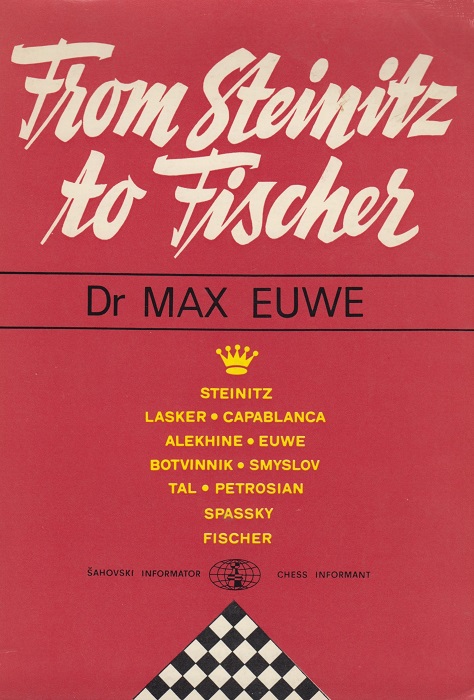
David Prabitz (Graz, Austria) draws attention to the listing, strikingly inaccurate, of Lasker v Janowsky matches on page xviii of From Steinitz to Fischer by Max Euwe (Belgrade, 1976):
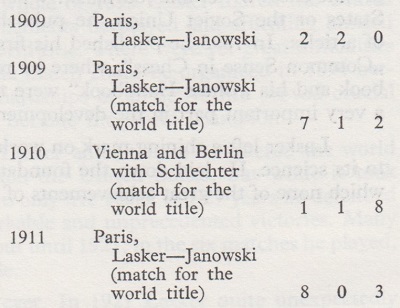
It must be wondered how much involvement Euwe had in a work which states, for instance, that Capablanca brought out a book entitled The Beginners’ Handbook in 1932 (page xx) and which has this, regarding chess in 1927, on page xxiii:

The imprint page:
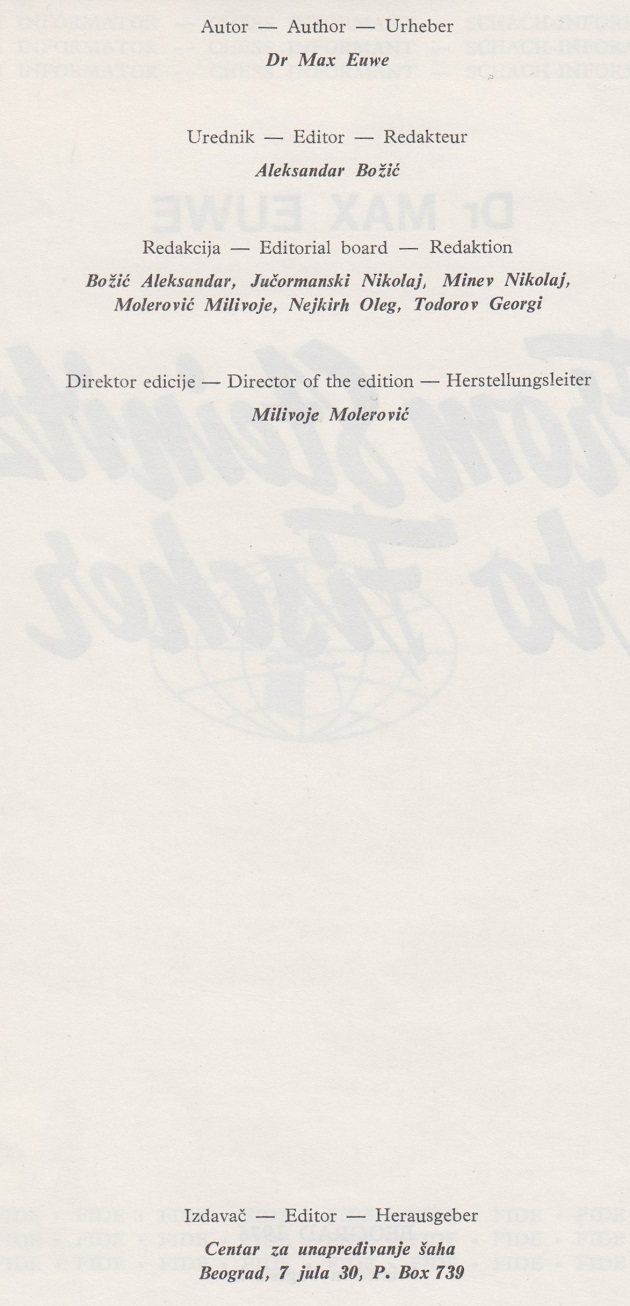
(11333)
It is worth recalling that the two masters nearly played a world championship match in 1900. Page 243 of La Stratégie, 15 July 1899 announced that Lasker had accepted a challenge from Janowsky and had set at £400 the stakes for a match beginning between 15 January and March 1900.
The long list of conditions was given on pages 289-290 of the 15 October 1899 issue of La Stratégie, but by then the proposed match had hit the rocks owing to a single point of disagreement: the number of wins required by the winner. Janowsky, citing the sequence of precedents going back to 1886, wanted an encounter of ten games up, while Lasker insisted on eight. The magazine commented:
‘Mr Lasker claims that as “The Champion” he has the right to impose his conditions; however, we believe that after posing 23 conditions of which 22 have been accepted he would have been courteous not to show intransigence on the only condition refused. We are also convinced that the chess world will, like ourselves, find that matches for the world championship must always be played under the same conditions, the victor being the first to win ten games.’
(2480)
To the Chess Notes main page.
To the Archives for other feature articles.
Copyright: Edward Winter. All rights reserved.